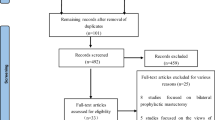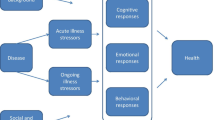Abstract
Cancer psychology is a vitally important part of cancer management. Qualitative research is a gateway to exploring this. Weighing the treatment options in terms of quality of life and survival is important. Given the globalization of healthcare seen in the last decade, the exploration of the decision-making process in a developing nation was deemed highly appropriate. The aim is to explore the thoughts of surgical colleagues and care providing clinicians about patient decision-making in cancer care in developing countries, with special reference to India. The secondary objective was to identify factors that may have a role to play in decision-making in India. A prospective qualitative study. The exercise was carried out at Kiran Mazumdhar Shah Cancer Center. The hospital is a tertiary referral center for cancer services in the city of Bangalore, India. A qualitative study by methodology, a focus group discussion was undertaken with the members of the head and neck tumor board. The results showed, in India, decision-making is predominantly led by the clinicians and the patient’s family members. A number of factors play an important role in the decision-making process. These include as follows: health outcome measures (quality of life, health-related quality of life), clinician factors (knowledge, skill, expertise, judgment), patient factors (socio-economic, education, cultural), nursing factors, translational research, and resource infrastructure. Important themes and outcomes emerged from the qualitative study. As modern healthcare moves towards a patient-centered care approach, evidence-based patient choice and patient decision-making clearly have a greater role to play, and the cultural and practical issues demonstrated in this article must be considered.
Similar content being viewed by others
References
Obeidat RF, Homish GG, Lally RM (2013) Shared decision making among individuals with cancer in non-Western cultures: a literature review. Oncol Nurs Forum 40(5):454–463
Smith TJ, Bodurtha JN (1995) Ethical considerations in oncology: balancing the interests of patients, oncologists, and society. J Clin Oncol 13(9):2464–2470
Lee K, Lee SH (2020) Artificial intelligence-driven oncology clinical decision support system for multidisciplinary teams. Sensors (Basel) 20(17):4693
Basch CE (1987) Focus group interview: an underutilized research technique for improving theory and practice in health education. Health Educ Q 14(4):411–448
Festervand TA (1984) An introduction and application of focus group research to the health care industry. Health Mark Q 2(2–3):199–209
Kitzinger J (1995) Qualitative research. Introducing focus groups. BMJ 311(7000):299–302
Gott M, Ingleton C, Bennett MI, Gardiner C. Transitions to palliative care in acute hospitals in England: qualitative study. BMJ 342:d1773
Jorgenson DL (1989) Participant observation: a methodology for human studies. Sage, Newbury Park, p 107
Zisman-Ilani Y, Obeidat R, Fang L, Hsieh S, Berger Z (2020) Shared decision making and patient-centered care in Israel, Jordan, and the United States: exploratory and comparative survey study of physician perceptions. JMIR Form Res 4(8):e18223
Shinkunas LA, Klipowicz CJ, Carlisle EM (2020) Shared decision making in surgery: a scoping review of patient and surgeon preferences. BMC Med Inform Decis Mak 20(1):190
Chaturvedi SK (2008) Ethical dilemmas in palliative care in traditional developing societies, with special reference to the Indian setting. J Med Ethics 34(8):611–615
Castleton K, Fong T, Wang-Gillam A, Waqar MA, Jeffe DB, Kehlenbrink L et al (2011) A survey of Internet utilization among patients with cancer. Support Care Cancer 19(8):1183–1190
Datta SS, Ghosal N, Daruvala R, Chakraborty S, Shrimali RK, van Zanten C et al (2019) How do clinicians rate patient’s performance status using the ECOG performance scale? A mixed-methods exploration of variability in decision-making in oncology. Ecancermedicalscience 13:913
Wood JJ, Metcalfe C, Paes A, Sylvester P, Durdey P, Thomas MG et al (2008) An evaluation of treatment decisions at a colorectal cancer multi-disciplinary team. Colorectal Dis 10(8):769–772
Ekerstad N, Lofmark R, Carlsson P (2010) Elderly people with multi-morbidity and acute coronary syndrome: doctors’ views on decision-making. Scand J Public Health 38(3):325–331
Barnhart JM, Wassertheil-Smoller S (2006) The effect of race/ethnicity, sex, and social circumstances on coronary revascularization preferences: a vignette comparison. Cardiol Rev 14(5):215–222
(2011) Overview of therapy and wellness professions. [cited 18.07.2011]. Available from: http://therapynext.com/Information/Types-of-Therapy.aspx
Ernst E, Cassileth BR (1998) The prevalence of complementary/alternative medicine in cancer: a systematic review. Cancer 83(4):777–782
Mahalakshmi S, Suresh S (2020) Barriers to cancer screening uptake in women: a qualitative study from Tamil Nadu. India Asian Pac J Cancer Prev 21(4):1081–1087
Author information
Authors and Affiliations
Corresponding author
Ethics declarations
Conflict of Interest
The authors declare no competing interests.
Additional information
Publisher's Note
Springer Nature remains neutral with regard to jurisdictional claims in published maps and institutional affiliations.
Supplementary Information
Below is the link to the electronic supplementary material.
Rights and permissions
About this article
Cite this article
Srinivasaiah, N., Ravishankar, N., Kuriakose, M.A. et al. A Qualitative Study of Decision-making (DM) in Surgery and Cancer Care: an Indian Perspective. Indian J Surg Oncol 14, 458–465 (2023). https://doi.org/10.1007/s13193-022-01521-x
Received:
Accepted:
Published:
Issue Date:
DOI: https://doi.org/10.1007/s13193-022-01521-x




